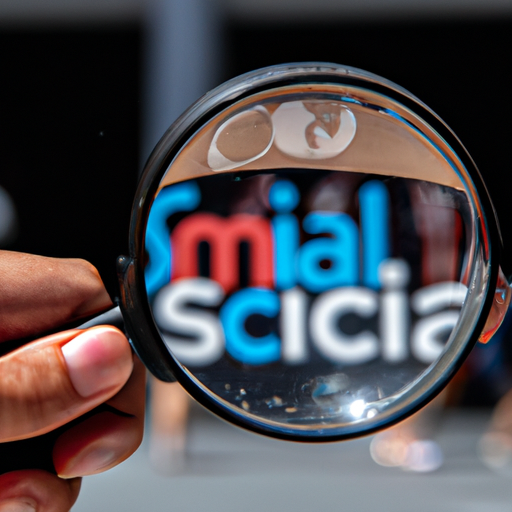In the digital age, with the rampant growth of social media platforms, businesses are facing a new challenge in protecting their trademarks. Social media trademark violations have become increasingly prevalent, causing significant harm to businesses and their brand reputation. This article aims to shed light on the legal ramifications of such violations and the steps businesses can take to safeguard their trademarks. Whether it is unauthorized use of logos, infringement through hashtags, or false association on social media, understanding the legal landscape surrounding these violations is crucial for protecting intellectual property. By familiarizing yourself with the common FAQs and their concise answers at the end of this article, you will gain valuable insights into this complex area of law and learn how to navigate potential trademark infringements on social media platforms effectively.
Overview of Social Media Trademark Violations
Social media trademark violations occur when individuals or businesses infringe upon the trademark rights of others on various social media platforms. Trademarks are important assets that help distinguish goods or services of one entity from those of another, and they play a crucial role in brand identity and consumer recognition. Understanding how these violations occur and their consequences is essential for businesses to protect their trademarks and avoid legal disputes.
What are social media trademark violations?
Social media trademark violations refer to unauthorized uses of trademarks, including logos, brand names, slogans, or designs, on social media platforms without the owner’s permission. These violations can take various forms, such as trademark infringement, misleading advertising, use of trademarks in usernames or handles, or the sale of counterfeit products. Such actions can mislead consumers, damage a brand’s reputation, and potentially harm the business.

Why are social media trademarks important?
Social media trademarks are essential for businesses as they serve as valuable assets that help establish brand identity and consumer trust. Trademarks allow customers to differentiate between competing products or services and enable businesses to maintain a competitive edge in the digital landscape. Protecting trademarks on social media platforms is crucial for preserving brand reputation, attracting and retaining customers, and ensuring legal compliance.
How do social media trademark violations occur?
Social media trademark violations can occur in several ways. One common violation is trademark infringement, where individuals or businesses use trademarks that are similar or identical to existing trademarks, causing confusion among consumers. Unauthorized use of trademarks in usernames or handles is also prevalent, as it can falsely suggest an affiliation with a particular brand. Misleading advertising through sponsored content or counterfeit products further perpetuates trademark violations on social media platforms.
Consequences of social media trademark violations
Social media trademark violations can have severe consequences for both the infringing party and the trademark owner. Legal disputes and litigation may arise, resulting in financial penalties, injunctions, and damage to the violator’s reputation. For businesses, trademark violations can lead to loss of customer trust, erosion of brand value, and decreased market share. Taking necessary precautions, enforcing intellectual property rights, and resolving disputes promptly can mitigate the potential negative impact of such violations.
Identifying Social Media Trademark Violations
Identifying social media trademark violations is crucial for businesses to protect their trademarks and take appropriate action. Here are some common ways trademark violations occur on social media platforms:
Trademark infringement on social media platforms
Trademark infringement on social media platforms involves the unauthorized use of trademarks that are similar or identical to existing trademarks, causing confusion among consumers. Identifying cases where trademarks are misused, counterfeited, or diluted is essential for trademark owners to protect their rights and maintain brand integrity.
Unauthorized use of trademarks in usernames and handles
Using trademarks in usernames or handles without permission can create a false association with a particular brand. This practice is particularly common on social media platforms where individuals or businesses want to capitalize on the reputation or popularity of a well-known brand. Monitoring usernames and handles containing trademarks is vital to prevent misleading associations.
Misleading advertising and sponsored content
Social media platforms provide various advertising options, including sponsored content. It is crucial for businesses to monitor sponsored content to ensure that their trademarks are not used in a misleading or deceptive manner. Identifying instances of false affiliations or misleading claims can help protect brand reputation and prevent consumer confusion.
Counterfeit products and trademark infringement
Counterfeit products and trademark infringement on social media platforms are prevalent issues for businesses. Identifying accounts or listings that sell counterfeit goods bearing trademarks can help businesses protect their brand value, consumer safety, and intellectual property rights.

Legal Framework and Enforcement
Understanding the legal framework and enforcement mechanisms surrounding social media trademark violations is essential for businesses to navigate potential disputes effectively. Here are some key aspects to consider:
Understanding trademark laws and regulations
Trademark laws and regulations vary by jurisdiction, and businesses should familiarize themselves with the legal standards that apply to social media trademark violations. Understanding concepts such as likelihood of confusion, dilution, and fair use can help businesses develop informed strategies to protect their trademarks.
Social media platform policies on trademark infringement
Social media platforms have policies in place to address trademark infringement. These policies outline the actions that platform administrators can take if trademark violations occur. Familiarizing oneself with these policies can help businesses understand the options available for reporting infringements and seeking resolution.
Cease and desist letters and takedown notices
When businesses discover social media trademark violations, they can take initial steps by issuing cease and desist letters or sending takedown notices to the individuals or platforms involved. These legal documents inform the infringing party of the violation and request them to cease the unauthorized use of the trademark or remove the infringing content.
Litigation and legal remedies for social media trademark violations
In cases where other measures fail to resolve the dispute, businesses can pursue litigation to enforce their trademark rights. Legal remedies may include injunctive relief, monetary damages, and orders for the infringing party to stop using the trademark. Consulting with a trademark attorney experienced in social media trademark disputes is crucial to navigate the legal complexities.
Prevention and Mitigation of Social Media Trademark Violations
Preventing and mitigating social media trademark violations require proactive strategies and vigilance. Here are some measures businesses can take:
Developing a comprehensive trademark strategy
Developing a comprehensive trademark strategy involves conducting thorough trademark searches, registering trademarks, and monitoring their use on social media platforms. By taking a proactive approach, businesses can identify potential violations early and take appropriate action to protect their trademarks.
Monitoring social media platforms for infringement
Regular monitoring of social media platforms allows businesses to identify instances of trademark infringement promptly. Utilizing online monitoring tools, hiring specialized services, or appointing dedicated personnel can help businesses detect violations and take quick action to prevent further harm.
Educating employees and partners about trademark policies
Raising awareness about trademark policies and the importance of intellectual property protection among employees and partners is crucial for maintaining brand integrity. By ensuring everyone understands the correct and authorized use of trademarks, businesses can minimize the risk of inadvertent violations and prevent potential legal disputes.
Enforcing intellectual property rights on social media
Promptly enforcing intellectual property rights on social media platforms is essential for deterring potential trademark violators. Sending cease and desist letters, reporting violations to social media platform administrators, and taking legal action when necessary can help businesses protect their trademarks and maintain brand reputation.

Benefits of Protecting Trademarks on Social Media
Protecting trademarks on social media platforms offers several benefits to businesses. Here are some advantages:
Brand reputation management and consumer trust
By actively protecting trademarks on social media, businesses can maintain a strong brand reputation and foster consumer trust. Preventing unauthorized use of trademarks helps ensure that consumers associate the brand with authentic and trustworthy products or services, enhancing their confidence in the business.
Increased visibility and marketing opportunities
Protecting trademarks on social media platforms opens up marketing opportunities for businesses. By controlling the use of their trademarks, businesses can engage with their target audience, build brand recognition, and reach a wider customer base, increasing visibility and potential sales.
Maintaining control over brand identity
Trademark protection on social media enables businesses to maintain control over their brand identity. By preventing unauthorized use or misrepresentation of trademarks, businesses can ensure that their brand messaging, values, and reputation remain intact, reinforcing their unique market position.
Securing competitive advantage in the digital landscape
Protecting trademarks on social media platforms allows businesses to gain a competitive advantage in the digital landscape. By safeguarding their intellectual property rights, businesses can prevent competitors from capitalizing on their brand’s reputation, retaining their market share and customer loyalty.
Case Studies on Social Media Trademark Violations
Reviewing case studies of social media trademark violations offers valuable insights into real-world scenarios and the consequences of such infringement. Here are some notable examples:
Famous trademark infringement cases on social media
-
In 2016, the luxury brand Louis Vuitton filed a lawsuit against a social media company for allowing users to post counterfeit products bearing the Louis Vuitton trademark. The court held the social media company liable for contributory trademark infringement, emphasizing the importance of platform responsibility.
-
The international fast-food chain McDonald’s faced a trademark dispute when a small Malaysian restaurant used a similar name and logo on social media. McDonald’s took legal action, and the Malaysian restaurant had to rebrand, demonstrating the significance of protecting trademarks against unauthorized use.
Lessons learned from successful enforcement actions
- A prominent beverage company successfully enforced its trademark rights when a social media influencer used its trademarked logo on a competing product in sponsored content. The brand promptly contacted the influencer and the social media platform, resulting in the removal of the infringing content and preventing potential consumer confusion.
Impact of social media on trademark litigation
Social media platforms have transformed the landscape of trademark litigation, introducing new challenges and opportunities. The rapid spread of information and the global reach of social media have accelerated the need for effective enforcement strategies. Courts worldwide have recognized the importance of trademarks on social media and have adapted legal frameworks to protect brand owners’ rights.
Working with a Trademark Attorney
Consulting a trademark attorney specializing in social media trademark violations provides numerous benefits for businesses. Here’s why you should consider seeking professional legal guidance:
Why consult a trademark attorney for social media violations
Trademark attorneys have expertise in intellectual property law and understand the nuances of social media trademark violations. They can assess your specific case, provide advice on legal strategies, and navigate the complex legal landscape to protect your trademarks effectively.
How a trademark attorney can assist with prevention and enforcement
A trademark attorney can assist with prevention by conducting thorough trademark searches, helping with trademark registration, and developing effective monitoring strategies for social media platforms. In enforcement actions, they can prepare and send cease and desist letters, initiate legal proceedings, and represent your interests in court if necessary.
Benefits of proactive legal guidance in safeguarding trademarks
Proactively seeking legal guidance helps businesses protect their trademarks before violations occur. By working closely with a trademark attorney, businesses can establish a strong legal foundation, develop comprehensive protection strategies, and respond promptly to potential infringements, minimizing the risks associated with social media trademark violations.
FAQs about Social Media Trademark Violations
What should I do if I discover a social media trademark violation?
If you discover a social media trademark violation, it is important to document the infringement and gather evidence. You can consult a trademark attorney to discuss the best course of action, which may include sending a cease and desist letter, reporting the violation to the social media platform, or initiating legal proceedings if necessary.
Can I use hashtags and trademarks together on social media?
While the use of hashtags and trademarks together on social media is possible, it is essential to use them correctly and in compliance with trademark laws. Using someone else’s trademark as a hashtag without permission can potentially lead to trademark infringement. It is advisable to consult a trademark attorney for specific guidance on using hashtags and trademarks together.
How long does it take to resolve a social media trademark dispute?
The time to resolve a social media trademark dispute varies depending on various factors, including the complexity of the case, cooperation from the infringing party, and the legal process involved. Some disputes may be resolved through cease and desist letters or takedown notices relatively quickly, while others may require litigation, which can take months or even years to reach a resolution.
What damages can be sought in a social media trademark infringement case?
In a social media trademark infringement case, a trademark owner can seek various types of damages, including actual damages (loss of sales or brand value), statutory damages, and, in some cases, the infringer’s profits obtained from the infringement. The specific damages sought will depend on the circumstances of the case and applicable laws.
Is it possible to recover legal fees in a social media trademark lawsuit?
In some jurisdictions, it may be possible to recover legal fees in a social media trademark lawsuit if certain conditions are met. These conditions may include prevailing in the lawsuit or demonstrating that the infringing party acted in bad faith. Consulting with a trademark attorney familiar with the local jurisdiction’s laws can provide more information on the possibility of recovering legal fees.
Conclusion
Social media trademark violations pose significant risks to businesses, necessitating proactive strategies to protect trademarks and preserve brand integrity. By understanding the types of violations, the legal framework, preventive measures, and benefits of safeguarding trademarks on social media, businesses can take appropriate actions to mitigate potential damage. Working with a trademark attorney can provide essential guidance and support, ensuring that businesses effectively navigate social media trademark disputes and maintain a strong legal position.
